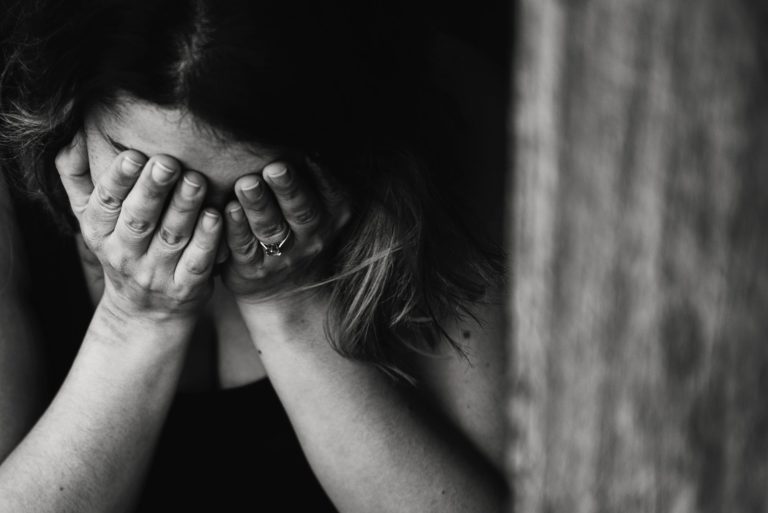Grieving during the pandemic: ‘We’ll only understand the trauma this was afterwards, when it’s safe’
The clocks have all been stopped, the stars put out; it feels as though everyone is grieving right now. Liadan Hynes looks at what it means to suffer loss in a time of national crisis, and finds that those who began this unprecedented period already in mourning, have wisdom to share.
“Be very careful,” is the advice of clinical psychologist Dr Tony Bates, to anyone grieving a loss that has occurred since the Covid-19 restrictions began.
“Grieving is when you really begin to feel the loss of something or someone that was important in your life. It’s the work we do in order to let them go. We grieve so that we can let go, and move on with life, not so that we forget them, or love them any less. It’s an activity of the heart.”
But at this moment, he points out, our world feels fundamentally unsafe, and this challenges our ability to process grief as we might normally.
“What we’ve learnt in psychology, is that it is very, very difficult when you’re in an unsafe situation, in the middle of crisis, to process emotionally the things that happened to you. So when people have experienced trauma, we now know it’s not good to go in, in the middle of that trauma, and start raising questions of how they feel. Because they’re engaged with trying to cope with it.
“Grief doesn’t necessarily come at a convenient time, so just to say to people: it’s very hard to grieve when you’re in the middle of something like this. The time for grief will come. We’ll only understand the trauma this was afterwards, when it’s safe.
“As long as it’s not safe, we have to deal with the reality of every day, and know that that’s enough. It’s not that we’re dishonouring somebody, but this is not a time for being overly emotional, because we’re in a real crisis, and we’re trying to cope with it. We may become emotional, and that’s fine, but it would be very wrong, I would think, for a psychologist to open things up emotionally with someone. Because it’s not safe.”
And it isn’t just recent losses that are so difficult. There isn’t – shouldn’t be – a ‘hierarchy of suffering’, as the writer Emma Hannigan used to describe it, but there is no doubt that public attention is mostly concentrated, at the moment, on the tragedies that have occurred as part of the crisis. Which can mean that those dealing with other forms of grief, grief from other sources, can feel almost guilty about expressing this.
For those who started this strange time already grieving, there are new challenges, new ways to try and cope. Their pain is not caused by Covid-19, but it is certainly affected by it, in a variety of ways.
When social isolation measures were introduced, writer Stefanie Preissner was mourning the loss of her beloved Nana, who died last September.
“I’ve found it kind of interesting, because when my Nana died, I was so annoyed and outraged that the world kept going, and I wanted everyone to stop and grieve with me. And not to expect me to have to show up in the world, in a way that I felt incapable of. And now that expectation has disappeared, and everyone is at home, and no one is expecting me to show up, and it’s really difficult. Because now, I’m sitting with my feelings in a way that is uncomfortable. The things that I used to distract myself are gone.”
Does it make it easier that in ways, to paraphrase WH Auden’s famous lines on grief, the clocks have been stopped? The whole world has been brought to a pause.
“This might sound selfish in a way, but it feels like now nobody has the bandwidth to support me because everybody has their own stuff going on,” Stefanie says. “There’s no one who this isn’t touching. And therefore I feel like when I have days when I’m just very sad about my Nana, there’s no one I can go to, guilt-free.
“Everyone has their own stuff to be dealing with; I don’t want to be adding to that. It sort of feels like we’re all in our own individual pods. Like stones on a beach. We’re all on top of each other, but we’re all just individual stones, really. There’s less of an ability to merge like the way two bubbles might become one bubble. We feel more calcified in our aloneness.”
Stefanie Preissner: the pain of packing up a life
To a certain extent, we are all in grief right now. Consider the waves of emotion that rise up suddenly – when you thought you had accepted the current situation, or at least were having a good day – and threaten to overwhelm you. The blinding rage; the inability to sleep, despite exhaustion. The feeling of resentment at other people seemingly not suffering to the same extent; the physical aches and pains; the fact that small tasks feel like moving mountains.
Partly, it’s the hypervigilant state we’ve all been thrown into; life is currently lived in a constant state of fight or flight. But these are also all symptoms of grief. Grief isn’t just a sad, slow, heavy emotion that weighs you down and makes you cry.
“And the collective grief of the world now, it’s like tinnitus. There’s this ringing in your ears that you can’t drown out.”
“Everyone is in grief now,” reflects Stefanie. “They maybe don’t know that what they’re feeling is grief, but the things I hear people saying about how they’re feeling, even when they haven’t lost someone – ripped from their old life, sad for the way things were, scared for the future – those are all of the feelings I was experiencing, and I continue to experience now, about my Nana. It least I had the honour and privilege of spending two uninterrupted weeks with her as she died. I was able to hold her, and in her last breaths tell her that it was OK, and that she could go, and we would be fine.
“I think people who haven’t experienced grief are like, ‘Why am I so tired? Why can’t I concentrate?’,” she continues. “It’s because you’re grieving. And the collective grief of the world now, it’s like tinnitus. There’s this ringing in your ears that you can’t drown out. We have a lot of free-floating anxiety. An inability to concentrate, to sleep. Sometimes physical pain. Also anger. People have been ripped away from the things that usually help them to cope.”
For TV presenter Brian Dowling, who lost his mother, Rosie, unexpectedly in February 2018 – the 61-year-old mother of seven had not been ill – the isolation period was a good thing. “I’m finding isolation is helping me with my grief,” he says. “I am at home in Rathangan with my family. I always feel an element of peace when I am at home. My husband Arthur has joined me here from LA. We all talk about mum on a regular basis, and I feel talking about her really helps me.
“Recently I’ve been reading about people who’ve lost loved ones during this global pandemic and my heart breaks for them. They can’t even be in the same room as their loved one as they pass. They can’t hold their hand or kiss them goodbye. They don’t get the big send-off they deserve or even a traditional funeral. Who would ever have imagined this would be the our new normal? I worry how this will affect the grieving process. If you burn your hand or your finger, you put it under the cold tap. Put healing cream on it. With grief, no one knows what to do.”
“Grief isn’t a normal thing; it makes you question everything. Grief is lonely.”
Last year, Brian launched his podcast, Death Becomes Him, in which he interviews others about their grief in an effort to understand his own. Guests have included Pippa O’Connor Ormond and Des Bishop. “It’s very dark,” he says when asked what he learned. “It can make you question everything. It’s very scary, and no one knows what to do with it. And there’s no secret to it. It’s so prolonged. It’s been with me every day for two years. I was looking at people that were older than my mum and I was so angry. Grief isn’t a normal thing; it makes you question everything. Grief is lonely.”
His advice? “Don’t put pressure on yourself. Take each day as it comes. You’re going to have good days; bad days. You’re not alone. That’s the thing. You’re not alone.”
Given that it is something we will all go through, it seems surprising that grief is the emotion we least understand. Which makes it so much harder when it does hit, and we experience things we never realised are part of the process: The waves of guilt. The white-hot rage. The physical aspects – panic attacks that can feel like imminent death; aches and pains; exhaustion.
To grieve is to feel othered; alone in a crowd. Going through the unknown, unexpected sides of grief compound that, making us wonder ‘Is it just me?’, when, in fact, it’s entirely normal.
“I think the hardest part for me was that nobody could understand how I was feeling. You feel sad and you want to cry, but grief is so much more,” says Sinead Hingston-Green, who was 19 weeks’ pregnant with her daughter Lily, and on holiday with Geoff, her husband of seven months, when he died during a boating trip. “And I know the grass is always greener, but a sudden death is always so shocking. Your whole world is just ripped from under you, instantly.”
Sinead recalls the physicality of her grief when Geoff died. “One of the things I struggled with, and still struggle with, was the tightening in my chest. Initially, it felt like I was going to have a heart attack. I think it’s so important to accept that no matter what way you’re feeling, it’s OK to feel that way. It’s all perfectly normal because grief is such a huge bag of different emotions, and struggles and anxieties. Nobody really knows how it’s going to affect them until it happens to you.”
Lily is now eight; Sinead has remarried, to Michael, and has a second child. Now, she and Michael are grieving the loss of one of their closest friends, Jade, who recently died unexpectedly. “They’re in South Africa, so we couldn’t get there. They made flowers out of origami, and said. ‘If you’d like to send a message to Jade, let us know and we’ll make up a flower for you’.”
It’s understandably difficult to talk about grief that doesn’t stem from bereavement at this time, but there’s no doubt that is there too. “We typically think of grief in terms of losing someone. But it’s also a response to losing some thing,” explains clinical psychologist Dr Nicola McGlade.
“A job, or even the loss of the world as we knew it; our lives as we knew them. And this is what we’re grieving as a collective right now. And while the current situation is temporary, we do know that things will be different afterwards. And currently we don’t know what that difference is going to be. Collectively, we are grieving.”
She outlines the stages of grief and some of the ways in which they are currently affecting us, even if we are not grieving a specific loved-one. Shock and denial, typically an initial phase of grief, in this case is manifesting as thinking, ‘well, the virus isn’t going to affect me…’ Anger, driven by anxiety and fear, over, for example, being made to stay at home, or people coming too close to us.
Bargaining: ‘OK, well I’ll stay at home for two weeks, because if I do that then everything’s going to be better, right? It’s going to be OK, we can return to normal.’ Depression, which brings with it feelings of guilt, depletion, hopelessness: ‘I don’t know when this is going to end’.
Hopefully, we get to the final stages of grief: acceptance, and hope; learning how to manage, moving on.
Dr McGlade points out that none of these stages are permanent destinations. That’s not how grief works; it is not linear. Instead, you are far more likely to spring back and forth between stages. The more you grieve, the more you will realise this. And that can help, because having got through a stage once, you know you can do it again, that this too will pass.
Grief is scary. At times, the strength of the emotions it rouses can feel overwhelming. It’s tempting to do anything other than face into them.
“Sit with the intense emotions,” Nicola recommends. “If that feels scary, focus on your breathing. Slowing your breathing will physiologically help your body calm down as well. [Breathe] In through your nose, out through your mouth. Try some grounding exercises. The 5-4-3-2-1 technique. And when the intensity of the emotion eases, engage in pleasant activity; connect with someone.”
Social isolation compounds that state of cutting oneself off, an instinct that is understandable, but not at all helpful, in coping with grief.
Nicola’s own father, Patrick McGlade, passed away last August, so she and her mother and two sisters went into this current crisis already grieving the loss of a beloved parent. Not being able to give physical support to your loved-ones in grief is the hardest part of the current situation, she reflects.
“What I find very difficult at the moment is seeing Mum. She has been cocooning on her own, which, a few months after you’ve lost your partner, is difficult. Not being able to physically give her a hug is very difficult. I was up with recently for a socially distant coffee – she sits on the patio, I sit on the grass, and we chat together, which is lovely. We did a virtual hug. When I was going, I really wanted to give her a hug, so I said: ‘Mum, put your left arm across your tummy, and put your right hand on your heart, and squeeze, and imagine that’s me giving you a hug’. And we both closed our eyes and did that. It didn’t replace the real thing, but it was lovely.”
The temptation with grief can be to go into your own personal bunker, particularly on the bad days. Social isolation compounds that state of cutting oneself off, an instinct that is understandable, but not at all helpful, in coping with grief.
“The most important thing is keeping in touch with people,” advises Sinead.
“Even if you don’t want to talk to them, text. Keep busy, even if it’s random stuff you don’t normally do. My little brother got me a colouring book, and I can’t tell you how relaxed it makes me feel, just to sit at the kitchen table with a packet of markers, and colour. This time has forced us all to slow down, but that’s the last thing you want to do when you’re grieving. You want to keep going; you want to keep distracted. I think the biggest bit of advice I can give is: try and keep yourself busy.”
Thinking too far into the future can also be overwhelming. Where possible, take it day by day – hour by hour, even. “Getting up each morning and making your bed. Achieving that one thing. It’s a good start to the day,” reflects Sinead.
Typically, it could be said that in Ireland, we do the early stages of loss well. We come together as a community to support the bereaved. We spend time talking about the person who has been lost. Currently, that stage of mourning has been largely taken from us, with restrictions only allowing a limited number of people to attend funeral services.
Journalist Elle Gordon lost her beloved father, Trevor Gordon (68) on April 1. He had been diagnosed with pancreatic cancer in May 2019. “We really hoped, like you always do when something like this comes along, that the treatment would work,” she says. “We will never forget the care he received from the staff of St Vincent’s Private Hospital. But unfortunately it just didn’t go his way. You really just hope for a miracle.”
Elle recently had a major operation to replace her hip, so she has been recuperating at her family home in Cavan for the past few months. “I’m really grateful, looking back, that I was here, that I was able to spend time with Dad. It’s a really sad time. Sad doesn’t even cover it. But I do have little pockets of really precious memories. Having lunch with him and my mum every day; we’d sit down and just have chats.”
In March, Elle’s father started to go downhill. “It all happened pretty rapidly, and then he was gone. I suppose what was particularly sad was that in the last few weeks before he passed, due to the restrictions, it was only we who could be with him – me, my mum, my sister and my brother. We were so thankful we could be with him, but still, it was hard for him, as I think he would have found great comfort in the company of extended family and friends. I know in normal circumstances, the house would have been packed with people. It’s been a surreal time, in the sense that we haven’t had that. I don’t know if in the long term, will it make us stronger? I don’t know. We haven’t had that thing of being able to lean on people. We’ve just had to keep standing ourselves.”
After Trevor died, restrictions meant the Gordons couldn’t have a wake or a typical funeral. “When we walked down our driveway behind the hearse, we came out on the road and we were just blown away – our neighbours from Virginia [Co Cavan], within 2km, had lined the road as the hearse was heading off. We know that would have meant so much to Dad.
“It was such a kind gesture, and it really helped us, because we did come back to the house afterwards and it was just the four of us,” Elle says, adding, “Normally, you would go for a meal after a funeral, and everyone who loved Trevor would have been there, and in the days after, people would have arrived with cakes and things. In normal circumstances, you’d be able to have a gathering; talk, reminisce, laugh and cry. Experience all those things that I think are quite cathartic. But [in the absence of that] we did still have each other, and felt huge support from all the love and kind words from afar. We feel so grateful for this and I think that’s important to say.
“The support that we have received – people are so kind,” Elle reflects. “Everyone’s grief is so personal, and it’s almost impossible to understand another person’s loss. But just by acknowledging and saying, ‘If you need me, I’m here’, that’s amazing. People’s messages make you feel like, ‘we’re not alone in this’. You can still reach out to people.”
The truth is, the national experience of grief is now so overwhelming that it will need to be reckoned with. “I think that when we come out of this situation, into this new normal, there’s going to be an awful lot of trauma that people who have lost someone are experiencing, but also people who haven’t lost someone,” says Stefanie Preissner.
“I think we’re going to all have to look at our mental health. I think there’s going to have to be some kind of mandate across the board, a concerted effort to approach people’s mental health with the same rigour with which we are approaching this virus.”
For more on managing grief, see episode five of Liadan Hynes’s podcast, ‘How to Fall Apart: The Support Series’, sponsored by Dunnes Stores, available on all major podcast platforms.
(This article was originally published on May 24 2020 in Independent.ie by Liadan Hynes)
ICPPD’s ONLINE Certificate in Bereavement & Loss (45 CPD Hours) is of interest to those who are seeking further information on Loss and Bereavement either as a professional or as someone healing from loss or perhaps supporting someone who is grieving. Find out more about our online course here.








